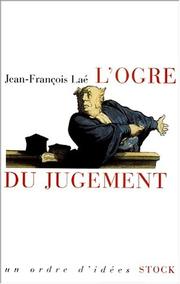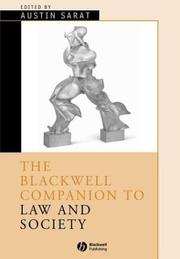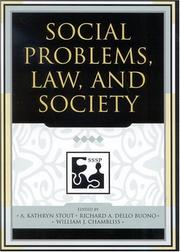| Listing 1 - 10 of 45 | << page >> |
Sort by
|

ISBN: 9782234054226 2234054222 Year: 2001 Publisher: Paris: Stock,
Abstract | Keywords | Export | Availability | Bookmark
 Loading...
Loading...Choose an application
- Reference Manager
- EndNote
- RefWorks (Direct export to RefWorks)
Judgments - France - History. --- Law - Social aspects - France. --- Justice - History of Law --- Judgments --- Law

ISBN: 0631228969 9780631228967 Year: 2004 Volume: 11 Publisher: Malden, Mass: Blackwell,
Abstract | Keywords | Export | Availability | Bookmark
 Loading...
Loading...Choose an application
- Reference Manager
- EndNote
- RefWorks (Direct export to RefWorks)
Law --- Social aspects --- Social aspects. --- Acts, Legislative --- Enactments, Legislative --- Laws (Statutes) --- Legislative acts --- Legislative enactments --- Jurisprudence --- Legislation --- Law - Social aspects

ISBN: 2091904333 9782091904337 Year: 1996 Publisher: Paris: Fernand Nathan,
Abstract | Keywords | Export | Availability | Bookmark
 Loading...
Loading...Choose an application
- Reference Manager
- EndNote
- RefWorks (Direct export to RefWorks)
Ethnological jurisprudence --- Sociological jurisprudence --- Ethnologie juridique --- Sociologie juridique --- Droit --- Law --- Aspect social --- Social aspects --- Anthropologie juridique --- Anthropologie juridique. --- Sociologie juridique. --- Aspect social. --- Droit - Aspect social --- Law - Social aspects
Book
ISBN: 9780198813637 9780199688111 0199688117 Year: 2015 Publisher: Oxford: Oxford university press,
Abstract | Keywords | Export | Availability | Bookmark
 Loading...
Loading...Choose an application
- Reference Manager
- EndNote
- RefWorks (Direct export to RefWorks)
Invitation to the sociology of international law aims to cast light on the under-explored sociological dimension of international law. The book emphasizes that international legal rules are profoundly embedded in diverse social factors and processes, such as norms, identity, and collective memory. Thus, international law often reflects and affects societal factors and processes in state societies and in the international community. The book exposes some central tenets of the sociological perspective and its core theoretical approaches, and presents a sociological analysis of several significant topics in present-day international law. The volume surveys subjects such as compliance, international economic law, legal fragmentation, law-making, and the impartiality of adjudicators, and reveals that a sociological analysis of international law enriches our understanding of social factors involved in the formation, evolution, and implementation of the law. Such analysis may not only explain past and present trends in international law but also bears significant implications for the interpretation of existing legal provisions, as well as suggesting better legal mechanisms for coping with contemporary challenges.
Droit international --- Sociologie juridique --- International law --- Sociological jurisprudence --- Aspect social --- Social aspects --- Sociologie juridique. --- Aspect social. --- Sociological jurisprudence. --- Social aspects. --- International law - Social aspects
Book
ISBN: 9781509914531 1509914536 9781509914555 9781509914548 1509914544 9781509914562 1509914560 1509914552 Year: 2018 Volume: volume 86 Publisher: Oxford: Hart,
Abstract | Keywords | Export | Availability | Bookmark
 Loading...
Loading...Choose an application
- Reference Manager
- EndNote
- RefWorks (Direct export to RefWorks)
What does social legitimacy entail within the multi-level 'embedded liberalism' construction of the internal market? How can the objectives of the internal market that focus on economic rights and a commitment to social diversity both be pursued without one necessarily trumping the other? These questions continue to challenge the very core of European integration. How can the diversity of Member States' 'social systems' and the varying normative infrastructure of their economies be sustainably accommodated within the internal market? This book seeks to contribute to these questions by discussing what has come to be known as the argument from transnational effects and the development of an adjudicative model for the European Court of Justice that can be termed 'socially responsive'. Drawing on the historical insights of Karl Polanyi it argues that the internal market can only be held to be socially legitimate where it supports the requirement for further market integration while still responding to social practices and values within the member states. The book presents in-depth studies of the case law of the Court in the areas of EU free movement, competition and state aid law. I.
Law --- Social aspects --- Droit --- Aspect social --- Europe --- European law --- Economic law --- European Union --- European Union countries. --- Social aspects. --- Law - Social aspects - European Union countries

ISBN: 0742542076 0742542068 9780742542068 9780742542075 Year: 2004 Volume: *1 Publisher: Lanham, Md.: Rowman & Littlefield,
Abstract | Keywords | Export | Availability | Bookmark
 Loading...
Loading...Choose an application
- Reference Manager
- EndNote
- RefWorks (Direct export to RefWorks)
Droit--Sociologie --- Gerechtelijke sociologie --- Law--Sociology --- Problèmes sociaux --- Recht--Sociologie --- Rechtssociologie --- Social problems --- Sociale problemen --- Sociological jurisprudence --- Sociologie du droit --- Sociologie juridique --- Sociologie van het recht --- Sociology of law --- Law --- Social aspects --- United States --- Law - Social aspects - United States
Book
ISBN: 9780521687119 9780521867511 052168711X 0521867517 9780511780813 1107210267 0511852452 9786612908200 0511931263 0511932618 0511929935 0511924887 0511780818 1282908200 0511927428 9780511929939 9780511932618 9780511927423 9781107210264 9780511852459 9781282908208 6612908203 9780511931260 9780511924880 Year: 2010 Publisher: New York: Cambridge university press,
Abstract | Keywords | Export | Availability | Bookmark
 Loading...
Loading...Choose an application
- Reference Manager
- EndNote
- RefWorks (Direct export to RefWorks)
"In this book, Andrew Riggsby offers a survey of the main areas of Roman law, both substantive and procedural, and how the legal world interacted with the rest of Roman life. Emphasising basic concepts, he recounts its historical development and focuses in particular on the later Republic and early centuries of the Roman Empire. The volume is designed as an introductory work, with brief chapters that will be accessible to college students with little knowledge of legal matters or Roman antiquity. The text is also free of technical language and Latin terminology. It can be used in courses on Roman law, Roman history, or comparative law, but it will also serve as a useful reference for more advanced students and scholars"--
Roman law --- Droit romain --- Social aspects --- Aspect social --- Social aspects. --- Civil law --- Civil law (Roman law) --- Law --- Law, Roman --- Arts and Humanities --- History --- Roman law - Social aspects --- Civil law.
Book
ISSN: 12961698 21013128 ISBN: 9782213666549 2213666547 Year: 2016 Publisher: Paris: Arthème Fayard,
Abstract | Keywords | Export | Availability | Bookmark
 Loading...
Loading...Choose an application
- Reference Manager
- EndNote
- RefWorks (Direct export to RefWorks)
Pendant plusieurs années, Geoffroy de Lagasnerie s'est rendu à la cour d'assises de Paris. Il a vu être jugés et condamnés des individus accusés de braquage, d'attentat, d'assassinat, de coups mortels, de viol. À partir de cette expérience, il propose une réflexion sur l'État pénal, le pouvoir et la violence. Nos manières de rendre la Justice s'inscrivent dans un système général et a priori paradoxal : pour juger, les procès construisent une narration individualisante des acteurs et des causes de leurs actes ; mais, pour réprimer, ils transforment chaque action interindividuelle en agression contre la « société » ou contre l'« État ». Comment comprendre ce système du jugement et de la répression et ce jeu des catégories pénales ? La Loi est souvent présentée comme instaurant le règne de la raison contre les réactions passionnelles. Ne produit-elle pas en réalité des effets de dépossession et du traumatisme ? À quelles conditions une sociologie critique pourrait-elle nous donner les moyens d'imaginer un droit moins violent, un État moins souverain et une justice plus démocratique ? En mêlant récits et analyses théoriques, Geoffroy de Lagasnerie montre que l'institution judiciaire ne forme pas seulement une réponse à la délinquance. La scène du tribunal, où un individu est forcé de comparaître devant des juges, est un miroir grossissant de notre appartenance à l'État. Si bien que, au bout du compte, cet ouvrage offre une exploration de notre condition de sujet politique
Sociologie juridique. --- Droit pénal. --- Droit --- Philosophie. --- Sociological jurisprudence --- Law --- Social aspects --- Justice pénale --- Violence institutionnelle --- Administration --- Sociologie --- Criminal law --- Sociologie juridique --- Droit pénal --- Philosophy --- Philosophie --- Droit pénal --- Law - Social aspects --- Justice pénale
Book
ISBN: 9780226426037 0226426033 9780226005812 022600581X Year: 2011 Publisher: Chicago: University of Chicago press,
Abstract | Keywords | Export | Availability | Bookmark
 Loading...
Loading...Choose an application
- Reference Manager
- EndNote
- RefWorks (Direct export to RefWorks)
Conundrums, puzzles, and perversities: these are Leo Katz’s stock-in-trade, and in Why the Law Is So Perverse, he focuses on four fundamental features of our legal system, all of which seem to not make sense on some level and to demand explanation. First, legal decisions are essentially made in an either/or fashion—guilty or not guilty, liable or not liable, either it’s a contract or it’s not—but reality is rarely as clear-cut. Why aren’t there any in-between verdicts? Second, the law is full of loopholes. No one seems to like them, but somehow they cannot be made to disappear. Why? Third, legal systems are loath to punish certain kinds of highly immoral conduct while prosecuting other far less pernicious behaviors. What makes a villainy a felony? Finally, why does the law often prohibit what are sometimes called win-win transactions, such as organ sales or surrogacy contracts?Katz asserts that these perversions arise out of a cluster of logical difficulties related to multicriterial decision making. The discovery of these difficulties dates back to Condorcet’s eighteenth-century exploration of voting rules, which marked the beginning of what we know today as social choice theory. Condorcet’s voting cycles, Arrow’s Theorem, Sen’s Libertarian Paradox—every seeming perversity of the law turns out to be the counterpart of one of the many voting paradoxes that lie at the heart of social choice. Katz’s lucid explanations and apt examples show why they resist any easy resolutions.
Law --- Law and ethics. --- Droit --- Droit et morale --- Interpretation and construction. --- Social aspects. --- Interprétation --- Aspect social --- Law and ethics --- Interpretation and construction --- Social aspects --- Interprétation --- Law - Interpretation and construction --- Law - Social aspects
Book
ISBN: 9782862724591 2862724599 Year: 2007 Publisher: Saint-Etienne: Publications de l'Université de Saint-Étienne,
Abstract | Keywords | Export | Availability | Bookmark
 Loading...
Loading...Choose an application
- Reference Manager
- EndNote
- RefWorks (Direct export to RefWorks)
Disciplinary power --- Professions --- Law --- Sanctions (Law) --- Law and legislation --- Social aspects --- Disciplinary power - France - Congresses --- Professions - Law and legislation - France - Congresses --- Law - Social aspects - France - Congresses --- Sanctions (Law) - France - Congresses
| Listing 1 - 10 of 45 | << page >> |
Sort by
|

 Search
Search Feedback
Feedback About UniCat
About UniCat  Help
Help News
News